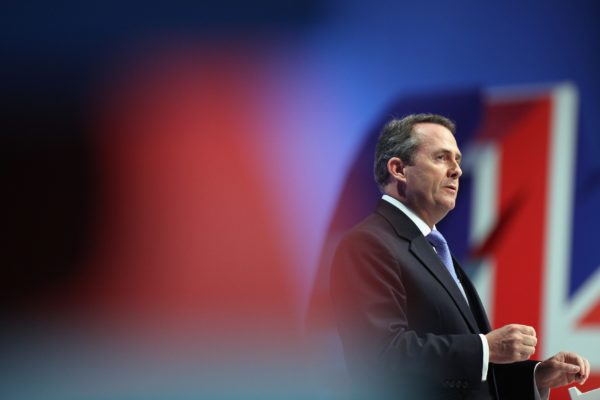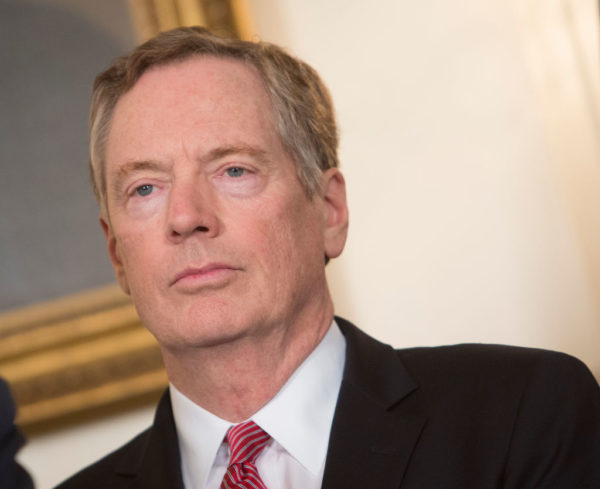Brexit: UK trade delegation to Washington had virtually no experience negotiating deals
Meanwhile, the 77-strong US delegation included seasoned trade officials with decades of negotiations under their belts

Liam Fox is so short of experienced trade negotiators that his delegation to Washington for talks on a post-Brexit deal had virtually no experience of negotiating trade deals, Unearthed can reveal.
In contrast, the 77-strong US delegation included seasoned trade officials with decades of negotiations under their belts.
The office of the US trade representative alone sent 20 officials with direct experience of negotiating and enforcing trade deals around the world.
The talks covered a range of subjects, including the controversial issue of agriculture and sanitary trade barriers – which is likely to have included discussions about lifting import restrictions on US products such as chlorine-washed chicken and hormone-reared beef.
The list of attendees and agenda from the first meeting of the US-UK trade and investment working group were obtained by Unearthed under the US freedom of information act.
Read the FOIA documents here
The attendee list reveals that trade secretary Liam Fox brought a delegation of 27 UK officials to the talks in Washington – the majority of which were senior staff from the department for international trade (DIT) and the department for exiting the EU (Dexeu).
Unearthed analysed the list and could not find one UK official with direct experience of negotiating trade deals.
Poorly prepared
A bilateral deal with the US is at the heart of trade secretary Liam Fox’s post-Brexit strategy – but questions have been raised over the ability of the UK to negotiate a fair deal with a much larger trading partner.
Speaking to Unearthed, shadow trade secretary Barry Gardiner said: “Liam Fox appears so desperate for a quick deal with the US that he is ready to sacrifice our health and safety, animal welfare and environmental standards for it.”
“But to have no clear idea of what he wants in return and to be without the experienced negotiators to deliver it risks making the UK look naive with our international trading partners,” he continued.
The department for international trade declined to comment on the experience of its delegation, but said:
“The UK-US trade working group held its inaugural meeting on 24 July and although it’s too early to say exactly what would be covered in a potential deal, this group will identify areas where we can work together to strengthen current and future trade and investment ties”.
“Early discussions will focus on our immediate priority of providing commercial continuity for US and UK businesses as the UK leaves the EU, and begin to lay the groundwork for potential negotiations on an ambitious free trade agreement.”
Hiring policy
The lack of experienced trade negotiators appears to be the result of a conscious DIT policy to recruit from within the UK civil service.
Last year DIT’s director of capability, Oliver Griffiths – who was part of the delegation – told MPs: “our focus on recruitment to date has been almost exclusively from Whitehall.”
The department has hired Crawford Falconer – a trade negotiator from New Zealand who most recently advised the hard-Brexit supporting Legatum Institute – but he was not part of the delegation to Washington.
The officials Fox did bring with him consisted of career diplomats; treasury officials; and policy advisors from the departments for environment (Defra) and culture, media and sport (DCMS).
The most experienced diplomat in the group, former Singapore high commissioner Antony Phillipson, has since left Dexeu.
Two senior staff from DIT – Griffiths and Richard Salt – do have a background in trade policy, but do not appear to have directly negotiated trade agreements.
One senior advisor at Dexeu was working as a procurement officer for Enfield Council as recently as March 2016.
While the lead trade negotiator for the department for environment, Ceri Morgan, joined the department from the British Film Institute and prior to this held policy roles at DCMS and Defra.
US delegation
In contrast, the US delegation was led by trade representative Robert Lighthizer, who has negotiated over two dozen bilateral international agreements and practiced international trade law for over 30 years – a role which involved the enforcement of trade deals.

Other senior staff attending the talks from the office of the trade representative also have decades of experience.
The department’s deputy general counsel, Maria Pagan, was the lead US attorney for numerous trade negotiations, including the Trans-Pacific Partnership and the Peru and Colombia free trade agreements.
The US trade representative’s deputy assistant for Europe, David Weiner, was the deputy chief negotiator during the TTIP negotiations and has held his brief since 2002.
In total, 20 of the 28 attendees from the office of the US trade representative have been directly involved in trade negotiations.
Chlorine chicken
The agenda for the working group included meetings on trade strategy; textiles and apparels; regulatory issues; industrial tariffs and agriculture.
Prior to the talks Fox played down the significance of the controversy over chlorine-washed chicken, calling it: “a detail in the very end stage of one sector of a potential free-trade agreement”.
But the agenda reveals that the US and UK spent 2 hours discussing “agriculture and SPS” – longer than any other sector.
SPS refers to sanitary and phytosanitary trade issues – such as the controversies over chlorine-washed chicken and hormone-reared beef – which the US has consistently highlighted as unacceptable barriers to trade with the EU.
Speaking to Unearthed, Edward Barker of the UK’s National Pig Association – which has concerns over the lifting of import restrictions on US pork fed with Ractopamine growth stimulants – said:
“The sector cannot afford to be undermined by cheaper, welfare inferior imports resulting from free trade. Use of Ractopamine, antibiotics for growth promotion and sow stalls are all examples of production methods, illegal in the UK yet used in non-EU nations. It is both an issue of fundamental fairness in business and of consumer confidence in food production.”
In a joint press release with the US trade representative, Robert Lighthizer, Fox said the talks would: “start to lay the groundwork for potential negotiations on an ambitious free trade agreement. The US is our single largest trading partner therefore we have a strong foundation on which to build.”




